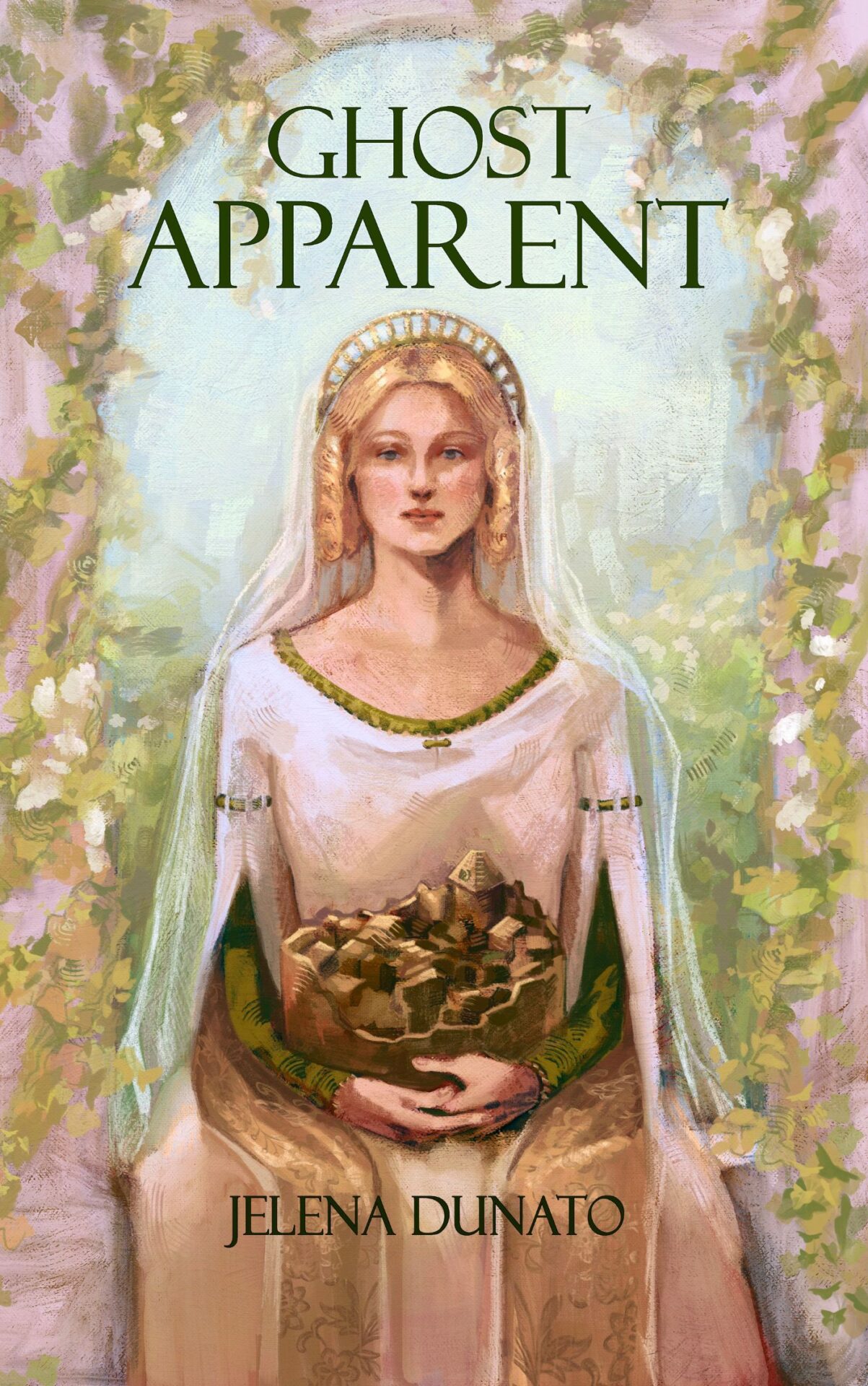
Jelena Dunato is joining us today to talk about her novel, Ghost Apparent. Here’s the publisher’s description:
Betrayed, deposed and presumed dead.
When her father is killed in a bloody coup and her uncle seizes the city, Orsiana pleads for help with the only power still willing to listen, unaware that the gods will use her as a pawn in their own game.
Thrown back on the streets of Abia, armed with the gods’ double-edged gifts, Orsiana must thwart her uncle’s plans and learn what it takes to rule a proud, stubborn city that thrives on artifice and wit. She will plot, fight and use lethally tuned verse to stir a rebellion. But just when her uncle’s Machiavellian schemes start to topple, a new player will enter the game, and the gods will raise the stakes. It’s easy to fight an enemy you hate, but how about an enemy you fall in love with? If she wants to win, Orsiana will have to risk the last precious thing in her possession: her heart.
A story of revenge and recovery, Ghost Apparent blends the history and folklore of the Eastern Adriatic with the bloody treachery of the Renaissance courts and is a perfect read for the fans of dark political fantasy.
What’s Jelena’s favorite bit?

Watching Dubrovnik from its magnificent walls last winter, admiring the red roofs and white stones basking in the sunshine, the incomparable quality of the clear, golden light that seduced painters and poets alike, it occurred to me that, if this image was all that people knew of Croatia, it would probably be enough.
Unfortunately, the publishing industry doesn’t work with tourist boards and my books often get bunked with much larger cultures under the label of “Slavic fantasy”. Imprecise and vague, this signals that the book probably contains bits of Polish or Russian folklore, snowy landscapes, tiny wooden houses infested with household spirits and maybe even a guest appearance by Baba Yaga. No sunlit coastal towns, no olive groves, no brilliant blue waves – no trace of my heritage. And yet, I am just as Slavic as any Polish or Russian person, but I am also Mediterranean, living on the coast where dozens of cultures and peoples mixed over the centuries. In order to be true to my heritage, I’ve decided to build a Slavic world inspired by the Eastern Adriatic.
Ghost Apparent, my upcoming novella, is a short work with some big world building. This doesn’t mean it’s bogged down by extensive descriptions or info dumps: the story moves fast, but it moves through a multi-layered setting, an intricate tapestry of history, art, culture and folklore which extends beyond the borders of this little novella.
Let me introduce you to Abia, a town which I wrote as a love letter to all the ancient, beautiful, proud walled towns of the Adriatic coast, and their complex and turbulent history. It is built of sunlight and stone, mixing the medieval architecture – Romanesque and Gothic – with the early Renaissance.
Perhaps I should let one of my characters describe it:
“You’ll love its narrow streets, teeming docks, colourful sails and ancient palaces. It’s more alive than any town I’ve seen, bristling with pride and insolence. It doesn’t reveal its beauty easily, but there are autumn afternoons when the light is soft and golden, and the walled gardens smell of oranges and jasmine. There are shadowy squares with fountains, where young men fence out of boredom, houses with heavy wooden shutters and light curtains lifted by the summer wind, there’s salt in the air, and the constant, faraway sound of the waves.”
Who rules such a town? A clever ruler with a light touch, who understands the illusion of self-ruling. Orsiana, my heroine, survives a bloody coup and escapes with nothing but her life. To reclaim power, she must first understand what power means in a free medieval commune with its own Council, its ruling patrician class and its version of democracy. I wanted to create a system of government which cannot be easily taken over by brute force nor inherited automatically, where the ruler who can’t feel the pulse of the city loses their position quickly. Too often is medieval fantasy filled with conquerors and absolute feudal rulers – I wanted Machiavellian intricacy, a fine balance of power.
And yet, my aim wasn’t to write a purely historical novella. Behind the layers of history and politics beats a dark fantasy heart, filled with Croatian folklore, and a bunch of capricious gods, flawed, dangerous and powerful. There’s Korab, the God of the Sea and his sea maidens; Veles the Trickster and his riddles; Lada, the Goddess of Love and her fountain of youth and Morana, the Goddess of Death. And like in every good fairy tale, where every fulfilled wish is also a curse, my heroine has to learn how to handle their double-edged gifts as she fights for her life, her birthright and her heart.
“Ghost Apparent” is a dark fantasy novella inspired by my heritage. If my world building, with all the elements of art, history and folklore I’ve mentioned, manages to shake the “Slavic” label and move the focus towards the SE Slavic cultures, I will consider it a success.
LINKS:
BIO:
Jelena Dunato is an art historian, curator, speculative fiction writer and lover of all things ancient. She grew up in Croatia on a steady diet of adventure novels and then wandered the world for a decade, building a career in the arts.
Jelena’s stories have been published in Beneath Ceaseless Skies, The Dark, Future SF and Mermaids Monthly, among others. She is a member of SFWA and Codex. Her novel, Dark Woods, Deep Water, was published in September 2023. Her new novella, Ghost Apparent, is coming out in September 2024.
Jelena lives on an island in the Adriatic with her husband, daughter and cat.
